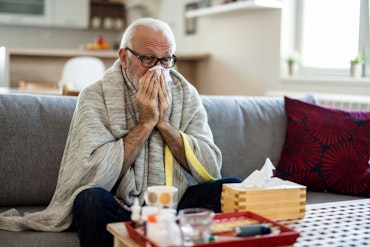National fitness project to encourage more exercise in over 65s
Researchers from the University of the Sunshine Coast (USC), Queensland, will contribute to a new national project that is aiming to encourage more weekly exercise among people over the age of 65.
![<p>University of the Sunshine Coast researchers will contribute to the national exercise project by holding an aquatic class for people over the age of 65. [Source: Shutterstock]</p>](https://agedcareguide-assets.imgix.net/news/articles/news/articles/National-aquatic-program-to-encourage-more-exercise-in-over-65s-12_2_2020.jpg?fm=pjpg&format=auto&w=550&q=65)
University of the Sunshine Coast researchers will contribute to the national exercise project by holding an aquatic class for people over the age of 65. [Source: Shutterstock]
Pool based exercise classes will be run out of the USC’s new aquatic facility, as a part of the Exercise & Sports Science Australia (ESSA) ‘Exercise Right for Active Ageing’ (ERAA) project.
The ERAA project includes other types of exercise class formats across the nation, including general fitness, strength and conditioning, aquatic exercise, falls prevention and balance.
All of these classes will be offered by exercise physiologists and professionals across Australia.
Associate Professor in Clinical Exercise Physiology, Suzanne Broadbent, will be leading the USC aquatic classes in Queensland while collecting data for the program.
Professor Broadbent says, “The national project aims to provide 15,000 older Australians the opportunity to have access to subsidised exercise classes to improve their overall health and wellbeing.
“USC’s new 25m recovery pool will be used for local classes as part of the project, which is an exciting use of the facility as a rehabilitation tool for general health, not just for sporting injuries in elite athletes.”
The project is part of an initiative from the Australian Government and Sports Australia to encourage more physical activity among older Australians.
While there have been many educational campaigns over the last few years to encourage more exercise, there is still a large portion of ageing adults who are inactive or don’t meet the recommended physical activity level.
Many older people are risking their health by not exercising enough, including developing conditions like type 2 diabetes, hypertension, or heart disease.
Professor Broadbent says exercise is important for older Australians to prevent or delay the onset of “lifestyle diseases”.
The USC aquatic exercise class wants to provide evidence that a 12-week exercise program can show health benefits and give confidence to older Australians to continue exercising after the program has finished.
In the aquatic exercise classes, there will be a combination of exercises for participants to engage in, such as balance, aerobic, strength and flexibility exercises, while in an environment that unloads the joints and provides some resistance to movement.
The water can also be very fun and relaxing to many people, who may enjoy this activity more than land-based exercise.
Local participants in the project will be monitored over 12 weeks to see their progress, and mapping the benefits they have received from consistent exercise.
“I’ll be recording general health factors like blood pressure and hand grip strength as well as several other functional mobility and balance tests before starting the weekly classes at the pool,” says Professor Broadbent.
“That information will help provide ESSA with a snapshot of the general health of over 65s in each state.
“While the Sunshine Coast is home to a lot of fitter, older residents, we know there are some people who have reached a certain age and believe it’s unsafe for them to exercise or have a condition they think makes them unable to be active.
“We hope this program supports renewed awareness and education around exercise and the benefits of regular engagement in sport and physical activity.”
The World Health Organisation (WHO) recommends about 150 minutes of moderate-intensity aerobic physical activity a week, 75 minutes of vigorous-intensity aerobic physical activity, or a combination of both.
However, Professor Broadbent says even if someone doesn’t do regular exercise all the time, doing something is better than doing nothing.
“The project will be running in metropolitan, rural and remote regions too, and that is really important given the barriers for residents in rural-remote areas, such as time, transport and access,” explains Professor Broadbent.
“Older adults may become more confident in utilising community-exercise offerings after project participation, and we would like to see many more seniors having the enthusiasm and motivation to exercise on their own or join in social or community-exercise groups.”
This program is supported through the Sport Australia ‘Better Ageing’ Grant.
If you are a resident over 65 years of age and interested in weekly discounted exercise classes, visit the Exercise Right website to sign up.











![The new Aged Care Act exposure draft is slated for release in December of 2023, but advocates hope to see it rolled out on January 1, 2024. [Source: Shutterstock]](https://agedcareguide-assets.imgix.net/news/articles/wp/agedcareact__0811.jpg?fm=pjpg&w=520&format=auto&q=65)












Comments